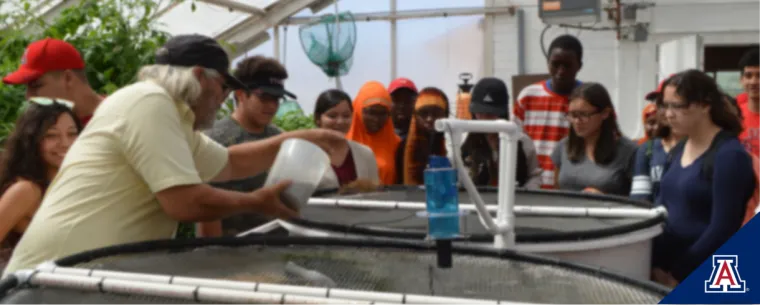
The University of Arizona’s Controlled Environment Agriculture Center (UA-CEAC) and technology/industry collaborators have come together to promote a remodeled aquaponics research, education, and outreach facility (UAqua Farm) at the UA-CEAC. The UAqua facility was updated to provide for engineering and science based research to address challenges and help advancing technology and crop production applications combining aquaculture with hydroponics. In addition, the facility will provide experimental education opportunities for students, schools, professionals and provide a means to education and inform growers and the public on aquaponics production technology.
The University of Arizona’s UAqua Farm is located at the Controlled Environment Agriculture Center is a three bay greenhouse, each bay 25ft by 25ft and an attached research lab and office. The first bay has two identical aquaponics systems, consisting of two production tanks and a single 4ft x 8ft media bed for plant production. In addition, a three tank fry and fingerling systems provides for additional culture of targeted fish, currently tilapia. The middle bay is reserved for graduate student research projects, either stand alone or utilizing the nutrient rich water from the two aquaponics systems. The third bay has nine interlinked Deep Water Rafts, 4ft x 8ft, that can be operated individually or linked together in groups of three or all nine. This will allow for studies on uptake and nutrient utilization with three or nine replicate treatments. A custom designed and built data acquisition systems enables real-time monitoring of air temperature, relative humidity, light intensity from the aerial environment and pH, electrical conductivity, dissolved oxygen in the production systems. In addition in the office/lab space, there is a small research lab that allows for detailed analysis of water chemistry.
Project Objectives:
-
To conduct engineering and science based research to address challenges and help advance technology and crop production applications utilizing aquaponic systems for fish and plant production.
-
To provide experimental educational opportunities for students and faculty.
-
To educate and inform growers and the public on aquaponic systems.


